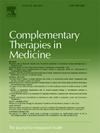Efficacy of horticultural therapy on symptoms and functional outcomes in individuals with depressive disorders: A systematic review and meta-analysis of randomized controlled trials
IF 3.5
3区 医学
Q1 INTEGRATIVE & COMPLEMENTARY MEDICINE
引用次数: 0
Abstract
Objective
This study evaluated the efficacy of horticultural therapy (HT) in improving affective symptoms and functional outcomes in individuals with depressive disorders.
Methods
A systematic search was conducted across the PubMed, EMBASE, Cochrane Library, CINAHL, CEPS, CNKI, and Wanfang databases. Randomized controlled trials (RCTs) implementing HT were included. Outcomes assessed included differences between HT and control groups in depression, anxiety, physical function, cognitive function, social function, and quality of life. A random-effects model was used to calculate Hedges’ g. Risk of bias was assessed using the Cochrane Risk of Bias tool, and the certainty of evidence was evaluated using the GRADE approach.
Results
Thirteen RCTs (n = 960) were included. HT significantly improved depression (g = 1.050; 95 % CI: 0.663–1.437), anxiety (g = 0.702; 95 % CI: 0.341–1.062), cognition (g = 0.816; 95 % CI: 0.302–1.331), social function (g = 0.806; 95 % CI: 0.295–1.317), and quality of life (g = 0.947; 95 % CI: 0.633–1.260). Only one study reported improvement in physical function. Subgroup analyses revealed greater effects among inpatients with more severe baseline symptoms who received combined indoor-outdoor HT in care-providing settings for more than eight weeks. However, the certainty of evidence across outcomes ranged from very low to low due to risks of bias, inconsistency, and imprecision.
Conclusion
This review provides preliminary support for the efficacy of HT in depressive disorders. Given methodological limitations and potential biases, further well-designed trials with registration, blinded assessors, and long-term follow-up are warranted.
园艺疗法对抑郁症患者症状和功能结局的疗效:随机对照试验的系统回顾和荟萃分析
目的:本研究评估园艺疗法(HT)在改善抑郁症患者情感症状和功能结局方面的疗效。方法:系统检索PubMed、EMBASE、Cochrane Library、CINAHL、cceps、CNKI和万方数据库。纳入实施HT的随机对照试验(RCTs)。评估的结果包括HT组与对照组在抑郁、焦虑、身体功能、认知功能、社交功能和生活质量方面的差异。使用随机效应模型计算Hedges' g。使用Cochrane风险偏倚工具评估偏倚风险,使用GRADE方法评估证据的确定性。结果:纳入13项rct (n = 960)。HT显著改善抑郁(g = 1.050;95% CI: 0.663 ~ 1.437),焦虑(g = 0.702;95% CI: 0.341 ~ 1.062),认知(g = 0.816;95% CI: 0.302 ~ 1.331),社会功能(g = 0.806;95% CI: 0.295 ~ 1.317)和生活质量(g = 0.947;95% CI: 0.633 ~ 1.260)。只有一项研究报告了身体功能的改善。亚组分析显示,基线症状更严重的住院患者在提供护理的环境中接受室内外联合HT治疗超过8周的效果更大。然而,由于存在偏倚、不一致和不精确的风险,结果间证据的确定性从非常低到低不等。结论:本综述为羟色胺治疗抑郁症的疗效提供了初步支持。考虑到方法学的局限性和潜在的偏倚,进一步设计良好的注册试验、盲法评估和长期随访是有必要的。
本文章由计算机程序翻译,如有差异,请以英文原文为准。
求助全文
约1分钟内获得全文
求助全文
来源期刊

Complementary therapies in medicine
医学-全科医学与补充医学
CiteScore
8.60
自引率
2.80%
发文量
101
审稿时长
112 days
期刊介绍:
Complementary Therapies in Medicine is an international, peer-reviewed journal that has considerable appeal to anyone who seeks objective and critical information on complementary therapies or who wishes to deepen their understanding of these approaches. It will be of particular interest to healthcare practitioners including family practitioners, complementary therapists, nurses, and physiotherapists; to academics including social scientists and CAM researchers; to healthcare managers; and to patients. Complementary Therapies in Medicine aims to publish valid, relevant and rigorous research and serious discussion articles with the main purpose of improving healthcare.
 求助内容:
求助内容: 应助结果提醒方式:
应助结果提醒方式:


